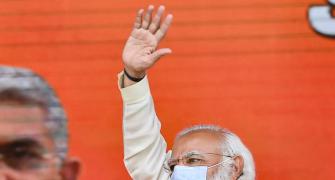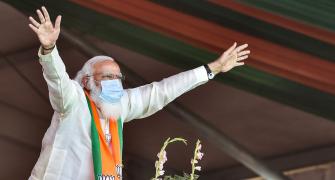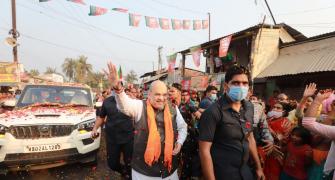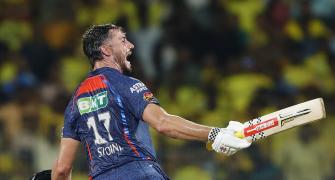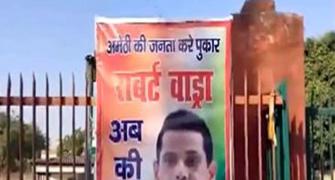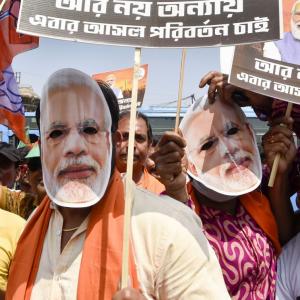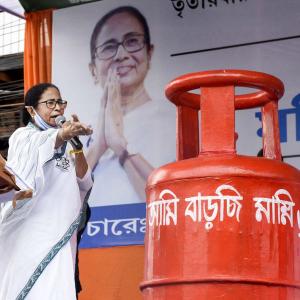'It did not start as a Hindutva slogan.'
'It started to tease the TMC and slowly it got internalised and the BJP started countering with Jai Shri Ram slogans because Mamata was getting provoked.'

Predicting the outcome of an election is a very difficult game, and more so if you are going against the tide.
While most opinion polls predict a victory for Mamata Banerjee's Trinamool Congress in the West Bengal assembly election despite the Bharatiya Janata Party's major surge, political researcher Dr Sajjan Kumar has a different take.
Dr Kumar says the BJP will see a clear cut victory in the state and everyone will be surprised on the day of counting -- May 2.
A PhD in political science from Jawaharlal Nehru University and now associated with People's Pulse, a Hyderabad-based political and research organisation, Dr Kumar tells Syed Firdaus Ashraf/Rediff.com, "Hindutva is a late phenomenon in Bengal. The base model is anti-TMC and on top of that is pro-BJP, Hindutva sentiment."
Opinion polls state that the Trinamool Congress will win the Bengal elections, but you alone predict a BJP win. Why are you so confident of your analysis?
I did the survey for two and a half months and finished in the first week of December. I visited all 294 constituencies. I do field study through a narrative method.
Before going to a constituency, I go through background literature by seeing the data from the Election Commission of the 2016 assembly election, 2019 general election and panchayat elections.
I also go through news reports and academic literature which is available of those areas.
I personally go to each constituency and I meet local experts of the constituency who have a sense of understanding for that constituency.
I then meet Bharatiya Janata Party leaders, Communist Party of India-Marxist leaders, Trinamool Congress leaders, other political leaders and social activists.
And after that I collect two things -- their view on what will be the outcome of the result of their constituency and the reason behind it.
And if you see (the analysis) of experts (those who have carried out opinion polls) they fail to read the shift that is happening on the ground among the common people.
I have seen cases where so-called experts fail to read the mood on the ground, especially in the Gujarat 2002 assembly election.
It happens because these experts go by the method of old assumptions and do not interact with the common people.
In my method, I also collect the demographic details of (each) constituency.
Census does give you SC/ST and Muslim population percentage, but it does not give you actual caste and community composition in each assembly constituency.
Once you get a rough picture about this, like I go to Nandigram constituency I do not ask who will win but I collect the data. like there are 28 to 30 per cent Muslims, 10 per cent are Dalits, 10 per cent are Brahmins etc. In this way, I get the caste demographic composition in each constituency.
Observers say Bengal has a 30 per cent Muslim population who will presumably not vote for the BJP. Additionally, the BJP will have to fight the TMC and CPI-M/Congress alliance for the non-Muslim votes.
This 30 per cent of Muslims are not evenly distributed across the 294 seats of West Bengal. For example, they are concentrated primarily in four districts of West Bengal -- Uttar Dinajpur, Dakshin Malda, Murshidabad, parts of Birbhum and parts of South 24 Parganas.
Muslims are decisive only in 60 constituencies out of the 294 constituencies of West Bengal.
For example, in Bhangar constituency, there are 80 per cent Muslims. In Murshidabad, there are 90 per cent Muslims. So this 30 per cent population of Muslims is decisive only in 60 to 65 assembly constituencies.
Hypothetically, say, take out 60 of the 294 seats for the BJP and that comes to 234 seats. So, what are the factors of caste and community that will go against the TMC in these 234 seats?
There is already a Hindu consolidation, but reasons are not Hindutva everywhere.
You go to North Bengal where the most prominent community happens to be Rajvanshi who are Dalits and they are decisively pro-BJP.
You then have Nama Shudra who are pro-BJP and then you have Bhadralok, eternal Bengali, predominant BJP but some of them are still with the TMC.
You then have the Gorkhas who have some confusion, but 50-70 per cent are pro-BJP.
You have Malda and Murshidabad which are Muslim concentrated constituencies. You have Muslims on one side and on the other side among the Hindus, you go and talk to them and you realise that the polarisation is terrible.
You then go to Birbhum, Aasansol, Purulia, West Ghajnipur, Durgapur and Chittranjan and you either have a Hindi-speaking population who have come and settled because of the industrial zone or you have tribal or Dalit areas where the BJP will sweep because the Muslim population suddenly falls to less than 10 per cent.
What about the BJP's development plank? Does that have any appeal or does only Hindu consolidation count?
It is not this or that. Primarily, the vote for the BJP is anti-TMC. It starts with that.
It is more of a negative vote against the TMC rather than a positive vote for the BJP.
The BJP has not suddenly become popular because of welfare schemes because by that logic then there are multiple schemes by the TMC, but the level of corruption is very high.
A state where besides daily wage or agriculture (for employment) there is no manufacturing or service sector.
And if you deprive people of their money due to corruption in that parallel economy too, then there is a sense of suffocation among voters.
The same thing happened with the Left Front government too.
There is one difference. It took the Left 34 years.
In the Left regime, corruption had many stake-holders. Local people also used to get money. If smuggling happened, like illegal trade of medicines or cow smuggling to Bangladesh, then everybody used to get a share. Now only TMC people get the money.
The corruption during the Left's regime was very subtle, but during the TMC rule this has happened in a very crude way and is brazen.
Unlike the Left, the TMC does not care for any ideological issue. The Left never used to target the common man in political violence, but that started happening in the TMC regime.
In the TMC rule, general people too started getting hounded. Common people were charged with false cases like drug charge or rape cases.
Even during lockdown, the TMC did corruption and took the money from MGNREGA which was the only source of livelihood for poor people. During cyclone Amphan too, TMC leaders indulged in corruption.
People are looking for an alternative and the BJP is an alternative for them.
But what we see on television is Jai Shri Ram slogans being raised against Mamata Banerjee by the BJP, to polarise Hindu votes.
Jai Shri Ram is an anti-Mamata slogan. It did not start as a Hindutva slogan. It started to tease the TMC and slowly it got internalised and the BJP started countering with Jai Shri Ram slogans because Mamata was getting provoked. It became a catchphrase (Mudra Dosh or Takiya Kalam).
Jai Shri Ram today has become the identifying greeting for everyone who is differentiating themselves against the TMC regime in Bengal.
Hindutva is a late phenomenon in Bengal. The base model is anti-TMC and on top of that is pro-BJP, Hindutva sentiment. The starting point was not Hindutva.
Opponents of the BJP say that the end of Mamata Banerjee's rule will mean the end of the last secular bastion.
This will lead to the end of secular politics permanently as the BJP is not an inclusive party, and the Hindu vote is all that will matter in India.
There are two ways of looking at things.
One is to look at it from an activist's viewpoint and another is the analyst's viewpoint. I do not subscribe to the activist's viewpoint. What secular vote does Mamata represent? The basis of secularism is that you do not subscribe to identity politics.
In Bengal, between 2011 and 2021 (Mamata's rule), she unleashed identity politics. Language of caste and community emerged over class which was predominant during the Left rule. I am not saying the Left was bereft of these things, but they were doing it subtly.
It was Mamata who started identity politics in a brazen way. Mathua Dalit became a Mathua Dalit and not a refugee or poor because of Mamata's political needs.
Because of Mamata's obsession to play identity politics, all the identities that the CPI-M was using in old times along class lines, they started getting recognised on ethnicity, caste or religion.
Muslim maulvis started getting money during Mamata's regime, then pujaris too started getting money. Durga pandals started getting Rs 50,000 from the government.
With all due respect, I want to know where is the secularism?
Do the Hindus of Bengal feel they are getting second-class treatment from the Mamata Banerjee government, especially because of what she did to allow the Muharram procession while telling Durga puja pandals to take a step backward during immersion?
Yes.
Like they say, 'Hindu khatre mein hai' and therefore Modi wins. Is that a factor in the Bengal election?
There is subtle Hindutva, and Hindutva has become an instrument and people do talk about these things, but the point is that people do not subscribe to a very radical version of Hindutva.
When people say Hindus are being marginalised, then it means in preference of polity terms of mayorship or in municipalities level, they have a perception that Hindus are being given second-hand treatment and Muslims are being preferred.
This perception is there and Hindutva is there, but it is not like they want Muslims to be kicked out or they want Muslim blood.
And does it mean the same Hindus, when they vote for the TMC they become secular and they become communal when they vote for BJP? The answer is no.
One needs to go deeper and find out primarily that they are voting with an anti-TMC sentiment which is responsible for the emergence of the BJP.
And secondly, if the BJP comes to power -- and I am sure they will come to power -- they will apply their politics of Hindutva in a systematic way like they do everywhere. That is their mobilisation strategy.
Secularism and Hindutva will face each other and secularism will recede.
But I am saying that Mamata has already buried secularism in practice because she politicised and started identity politics.
Secularism is not at all about fighting Hindutva, but also fighting caste, ethnicity and identity politics. You cannot give salaries to maulvis and then later say okay, let us give salaries to pandits of mandirs also.
Does it not matter that the BJP has no CM face to take on Mamata Banerjee?
The West Bengal election is a fight of Mamata versus Modi.
If you ask the people of West Bengal who is the candidate since you are going to vote for the BJP in your constituency, they say it does not matter to them as they are going to vote for the symbol of the BJP, not the candidate.

